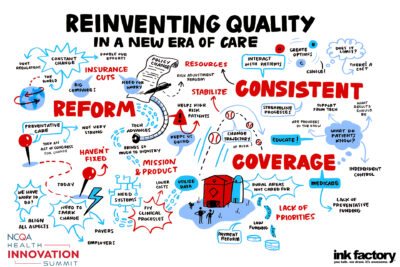Reinventing Quality in a New Era of Care: What Will It Take?
October 14, 2025 · NCQA Communications
As NCQA marks 35 years of advancing health care quality, the focus shifts from how far we’ve come to where we need to go next. What better place to have that conversation than the Health Innovation Summit, where industry leaders gather to discuss trending topics in health care.
NCQA Founder and President Peggy O’Kane moderated a powerhouse panel of visionary leaders—Mark McClellan of the Duke-Margolis Institute for Health Policy, J. Marc Overhage of The Overhage Group and Dana Erickson of Blue Cross Blue Shield of Minnesota—for a forward-looking discussion on the future of quality.
Challenges We Face in Reinventing Quality
The Medicare Advantage market is shrinking.
CMS projects that Medicare Advantage enrollment will fall by nearly 1 million members from 2025 to 2026—the first decline in decades. Large payers are exiting the market, leaving seniors searching for other coverage options.
Despite this trend, Erickson remains bullish on Medicare Advantage. “Beneficiaries like the experience because it provides care coordination and reduces the fragmentation that is so prevalent across our health care system,” says Erickson. “So, we believe it’s a good product and we still see a very bright future.”
Risk adjustment models are leaning towards ‘sick care’ and away from prevention.
McClellan explained that Version 28 of risk adjustment reform took out a lot of codes geared toward prevention and early stages of chronic disease that were being reported in Medicare Advantage plans. Those changes pushed us toward a fee-for-service infrastructure where downstream complications get coded more reliably than early interventions.
“Let’s not pay for the documentation, but for helping people see their risks and then change their risk trajectory,” says McClellan. “We can call it ‘paying for health.’ That’s what it really should be about.”
Technology creates opportunities, but setting priorities can be difficult.
In health care, we create programs for specific conditions, like heart disease or diabetes care, and we make progress. But the question is: How can we scale our efforts across a thousand different conditions and all of the other things we need to prioritize? That’s where we need to start thinking about systems and processes—and the data and technology that can enable large-scale change.
“Thirty years ago, the challenge was to get information into the clinician’s hands, and now we have care teams working in front of computer screens,” says Overhage. “We have data that is increasingly available and interoperable. We’re like 90% of the way there. I think in the next few years, with the right leadership and guidance, these systems will evolve in a way that makes care better for patients and makes our cost structure more sustainable.”
Value-based care has become a contested concept.
“Nobody knows what it is,” says Erickson. Because value-based care is so complex and has so many different definitions, it has been hard to implement—and that has led to disappointment within the industry. Until we reach a critical mass where we move enough of the financial incentive to pay for prevention and primary care, we’re going to get exactly what we’re paying for, which is acute care.
“Trying to do 5% of your operations one way while the other 95% is still being done another way just doesn’t work,” says Erickson. “You’re not changing the way you’re delivering care.”
Let’s Get This Train Moving
In closing, O’Kane asked each panelist to share the one thing we need to do right now to get the quality train moving in the right direction.
Alignment is key, says Overhage. “We need to continue to work on getting better alignment of the value proposition across the industry—that means patients, providers, health systems, health plans and the federal government—because the lack of alignment is going to continue to limit the progress that we can make.”
Erickson would double down on interoperability. “We have all of the technology, but we still haven’t done it right. We have to really commit to data interoperability—and that rising tide will lift all boats.”
McClellan would focus on getting data into the hands of patients. “I would like to see more groups embrace CMS efforts like ‘Kill the Clipboard’ and enable sharing of automated bulk FHIR® data. We are already heading in that direction with prior authorizations.”
Join Us Next Year
Mark your calendar for the 2026 Health Innovation Summit, October 4-7, in Atlanta, Georgia!









